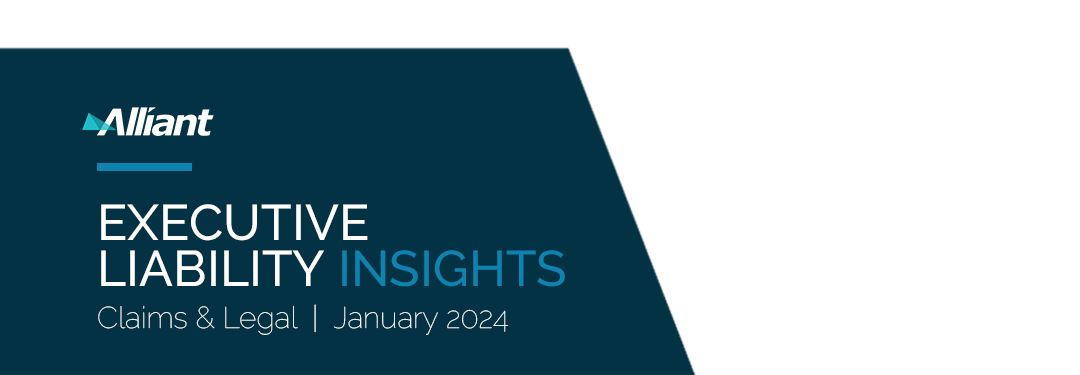
SECURITIES CORNER
A GENERALIZED LETTER FROM THE SEC ADDRESSED ONLY TO THE COMPANY IS NOT A CLAIM AGAINST INSURED PERSONS
Hertz Global Holdings, Inc. v. Alterra Am. Ins. Co., 2023 WL 8716803 (Del. Super. Ct. Dec. 18, 2023).


A Delaware Court held that the Insured could not relitigate whether an SEC investigation constituted a Securities Claim against an Insured following an earlier holding by a New York court in a suit the Insured filed against its Insurers. The New York court held that the SEC investigation for which the Insured sought coverage was not a Securities Claim. Additionally, the Delaware court examined whether a generalized letter from the SEC to the Insured constituted a Claim against insured persons.
After the SEC launched its investigation by sending a generalized letter to the Insured’s company (which neither named nor targeted any directors), the Insured tendered the matter to its primary and first excess Insurers. The Insurers denied coverage, which prompted the Insured to sue them in a New York Federal court. The New York court held that the matter did not qualify as a Securities Claim and that the Insured failed to demonstrate a pursuit for covered claims. Subsequently, the Insured filed a lawsuit against the excess Insurer in Delaware. In the Delaware suit, the Insured, again, argued that the SEC investigation constituted a Securities Claim and that the matter constituted a Claim against Insured Persons for a Wrongful Act.
The Delaware court identified numerous issues and ruled predominantly against the Insured. First, the court explained that it was procedurally precluded from reviewing a question that was already decided by the New York court because an interpretation of an insurance contract was not a pure question of law. The court also required the application of contract rules to facts at issue and since the second excess Insurer demonstrated that a New York court covered the issue already, it could not be relitigated. Second, in addressing the generalized SEC letter, the Delaware court disagreed with the Insured’s argument that it amounted to a “claim against unnamed and unreferred-to individuals because it was that they were being investigated.” According to the court, because the Insured company, and not its employees were named in the SEC letter, and was addressed to the Insured company alone, the letter did not constitute a Claim against Insured Persons to trigger a line of coverage under the D&O policy. Therefore, the court held, no coverage was available under the D&O policies.
SEC APPROVED EXCHANGE-TRADED PRODUCTS HOLDING BITCOIN


Recently, the SEC approved 11 exchange-traded products (ETP) holding bitcoin in a highly anticipated decision. The industry advocates hoped the decision would lead to more widespread adoption of ETP, crypto's biggest asset. The SEC approved the 19b-4 form’s requests to list the products from the Nasdaq Stock Market, CboeBZX Exchange, and NYSE Arca. Later, the SEC approved the registration statements from the issuers themselves, clearing them to begin trading. The SEC mentioned that despite approving the listings and trading of certain spot bitcoin ETP shares, it "did not approve or endorse bitcoin.” The SEC reiterated that "investors should remain cautious about the myriad risks associated with bitcoin and products whose value is tied to crypto."
For the last decade, early bitcoin adopters have been pressing the SEC to greenlight a spot bitcoin ETP by filing proposals for an exchange-traded trust holding bitcoin under the Securities Act of 1933. Until now, the SEC rejected dozens of proposals citing concerns that the market had not matured enough to prevent market manipulation associated with spot bitcoin. However, the most recent wave of submissions led by investment management companies has set a new tone. The SEC continues to face new filings similar to those that were disapproved in the past; however, the circumstances have changed.
Additionally, recently a high positioned federal court in DC held that the SEC's concerns regarding market manipulation were no longer substantiated. The court concluded that based on the record available to the SEC and the improved quality of the correlation analysis of that record, the SEC was able to conclude that the product was sufficiently immune to tampering. The approval of spot Bitcoin ETFs in the United States remains a monumental step forward and "marks the next phase for the industry by allowing U.S. investors to fully participate in the promise of Bitcoin."
|
Director/Officer |
Role |
Company |
|
Raymond J. Pirrello |
Founder |
Prior 2 IPO Inc. |
|
David Gentile |
CEO |
GPB Capital Holdings, LLC |
|
Henry Abdo |
Founder |
Titanium Capital LLC |
|
Mmobuosi Odoqwu Banye |
Founder/ Former CEO |
Tingo Group Inc. |
|
Director/Officer |
Role |
Company |
|
Raymond J. Pirrello |
Founder |
Prior 2 IPO Inc. |
|
David Gentile |
CEO |
GPB Capital Holdings, LLC |
|
Henry Abdo |
Founder |
Titanium Capital LLC |
|
Mmobuosi Odoqwu Banye |
Founder, Former CEO |
Tingo Group Inc. |
DECEMBER 2023 NOTEWORTHY SETTLEMENTS AND JUDGMENTS
|
Amount |
Director/Officer |
Role |
Company |
|
$2,218,599 |
Marc Wexler |
Director |
CodeSmart Holdings, Inc. |
|
Amount |
Director/Officer |
Role |
Company |
|
$2,218,599 |
Marc Wexler |
Director |
CodeSmart Holdings, Inc. |
Source: U.S. Securities and Exchange Commission
https://www.sec.gov/litigation/admin.htm